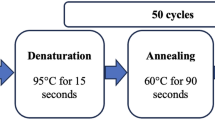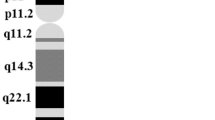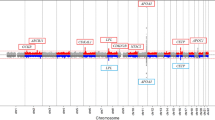Abstract
Objective:
To test for association of the ectonucleotide pyrophosphatase/phosphodiesterase 1 (ENPP1) K121Q polymorphism with body mass index (BMI) and diabetes in a large sample of Caucasians and African-Americans by selectively genotyping individuals at the extremes of the phenotypic distribution.
Subjects:
Subsets comprising the extremes of the BMI distribution (10th–20th and above the 90th BMI percentile for Caucasians and between the 10th–30th and above the 80th percentile for African-Americans) from a group of 10 260 Caucasian and 2268 African-American adults participating in New York Cancer Project were studied.
Methods:
Subjects were genotyped for the ENPP1 K121Q polymorphism by pyrosequencing and tested for association with BMI and diabetes by regression analysis.
Results:
Regression analysis with BMI as the dependent variable demonstrated a significant association (P=0.02) of genotype at K121Q with BMI, with no significant race-by-genotype interaction (P=0.30). Compared with Q/Q or Q/K individuals, the K/K individuals had a BMI approximately 1.3 kg/m2 higher, without effects of age, gender or race. By logistic regression analysis, the K121Q alleles had no significant effect on diabetes status (P=0.37) in obese subjects.
Conclusion:
In both Caucasians and African-Americans, the K121 polymorphism in ENPP1 was associated with increased BMI, but not with diabetes.
This is a preview of subscription content, access via your institution
Access options
Subscribe to this journal
Receive 12 print issues and online access
$259.00 per year
only $21.58 per issue
Buy this article
- Purchase on Springer Link
- Instant access to full article PDF
Prices may be subject to local taxes which are calculated during checkout
Similar content being viewed by others
References
van Driel IR, Goding JW . Plasma cell membrane glycoprotein PC-1: primary structure deduced from cDNA clones. J Biol Chem 1987; 262: 4882–4887.
Harahap AR, Goding JW . Distribution of the murine plasma cell antigen PC-1 in non-lymphoid tissues. J Immunol 1988; 141: 2317–2320.
Maddux BA, Goldfine ID . Membrane glycoprotein PC-1 inhibition of insulin receptor function occurs via direct interaction with the receptor α-subunit. Diabetes 2000; 49: 13–19.
Costanzo BV, Trischitta V, Di Paola R, Spampinato D, Pizzuti A, Vigneri R et al. The Q allele variant (Gln121) of membrane glycoprotein PC-1 interacts with the insulin receptor and inhibits insulin signaling more effectively than the common K allele variant (Lys121). Diabetes 2001; 50: 831–836.
Pizzuti A, Frittitta L, Argiolas A, Baratta R, Goldfine ID, Bozzali M et al. A polymorphism (K121Q) of the human glycoprotein PC-1 gene coding region is strongly associated with insulin resistance. Diabetes 1999; 48: 1881–1884.
Frittitta L, Baratta R, Spampinato D, Di Paola R, Pizzuti A, Vigneri R et al. The Q121 PC-1 variant and obesity have additive and independent effects in causing insulin resistance. J Clin Endocrinol Metab 2001; 86: 5888–5891.
Kubaszek A, Pihlajamäki J, Karhapää P, Vauhkonen I, Laakso M . The K121Q polymorphism of the PC-1 gene is associated with insulin resistance but not with dyslipidemia. Diabetes Care 2003; 26: 464–467.
Gu HF, Almgren P, Lindholm E, Frittitta L, Pizzuti A, Trischitta V et al. Association between the human glycoprotein PC-1 gene and elevated glucose and insulin levels in a paired-sibling analysis. Diabetes 2000; 49: 1601–1603.
Hamaguchi K, Terao H, Kusuda Y, Yamashita T, Hazoury Bahles JA, Cruz LLM et al. The PC-1 Q121 allele is exceptionally prevalent in the Dominican Republic and is associated with type 2 diabetes. J Clin Endocrinol Metab 2004; 89: 1359–1364.
Rasmussen SK, Urhammer SA, Pizzuti A, Echwald SM, Ekstrøm CT, Hansen L et al. The K121Q variant of the human PC-1 gene is not associated with insulin resistance or type 2 diabetes among Danish Caucasians. Diabetes 2000; 49: 1608–1611.
González-Sánchez JL, Martínez-Larrad MT, Fernández-Pérez C, Kubaszek A, Laakso M, Serrano-Ríos M . K121Q PC-1 gene polymorphism is not associated with insulin resistance in a Spanish population. Obes Res 2003; 11: 603–605.
Meyre D, Lecoeur C, Vatin V, Mouton S, Weill J, Froguel P . Genetic and phenotypic evidence for an obesity and insulin resistance on locus 6q16–q23 in French obese children. Diabetes 2003; 52 (Suppl 1): A26–A27 (abstract #115-OR).
Jenkinson CP, Richardson DK, Rodriguez L, Schneider J, Streng P, Arya R et al. Comprehensive analysis of SNPs in ENPP1: association with diabesity. Am J Hum Genet 2004; 75 (Suppl 1): 45 (abstract #137).
DeCosmo S, Argiolas A, Miscio G, Thomas S, Piras GP, Trevisan R et al. A PC-1 amino acid variant (K121Q) is associated with faster progression of renal disease in patients with type 1 diabetes and albuminuria. Diabetes 2000; 49: 521–524.
Canani LH, Ng DPK, Smiles A, Rogus JJ, Warram JH, Krolewski AS . Polymorphism in ecto-nucleotide pyrophosphatase/phosphodiesterase 1 gene (ENPP1/PC1) and early development of advanced diabetic nephropathy in type 1 diabetes. Diabetes 2002; 51: 1188–1193.
Endler G, Mannhalter C, Sunder-Plassmann H, Schillinger M, Klimersch A, Exner M et al. The K121Q polymorphism in the plasma cell membrane glycoprotein 1 gene predisposes to early myocardial infarction. J Mol Med 2002; 80: 791–795.
Rutsch F, Vaingankar S, Johnson K, Goldfine I, Maddux B, Schauerte P et al. PC-1 nucleoside triphosphate pyrophosphohydrolase deficiency in idiopathic infantile arterial calcification. Am J Pathol 2001; 158: 543–554.
Rutsch F, Ruf N, Vaingankar S, Toliat MR, Suk A, Höhne W et al. Mutations in ENPP1 are associated with ‘idiopathic’ infantile arterial calcification. Nat Genet 2003; 34: 379–381.
Mitchell MK, Gregersen PK, Johnson S, Parsons R, Vlahov D . The New York Cancer Project: rationale, organization, design, and baseline characteristics. J Urban Health 2004; 81: 301–310.
Quade D . Rank analysis of covariance. J Am Stat Assoc 1967; 62: 1187–1200.
Atwood LD, Heard-Costa NL, Cupples LA, Jaquish CE, Wilson PWF, D'Agostino RB . Genomewide linkage analysis of body mass index across 28 years of the Framingham Heart Study. Am J Hum Genet 2002; 71: 1044–1050.
Duggirala R, Blangero J, Almasy L, Arya R, Dyer TD, Williams KL et al. A major locus for fasting insulin concentrations and insulin resistance on chromosome 6q with strong pleiotropic effects on obesity-related phenotypes in nondiabetic Mexican Americans. Am J Hum Genet 2001; 68: 1149–1164.
Meyre D, Lecoeur C, Delplanque J, Francke S, Vatin V, Durand E et al. A genome-wide scan for childhood obesity-associated traits in French families shows significant linkage on chromosome 6q22.31–q23.2. Diabetes 2004; 53: 803–811.
Jacobsen BK, Bønaa KH, Njølstad I . Cardiovascular risk factors, change in risk factors over 7 years, and the risk of clinical diabetes mellitus type 2: The Tromsø study. J Clin Epidemiol 2002; 55: 647–653.
Acknowledgements
This study was supported by grants NIDDK 52431 and 56336, an American Diabetes Association mentored fellowship and support provided by the Academic Medicine Development Corporation (AMDeC) of New York. Naoki Matsuoka is also supported by Uehara Memorial Foundation and Foundation for Growth Science, Tokyo, Japan. We thank Robert Lundsten, Frank Fries, and Rebecca Yohannes for technical assistance and Ana Ignat, Lizzett Santiago, and Richard Sarver for assistance with manuscript preparation.
Author information
Authors and Affiliations
Corresponding author
Rights and permissions
About this article
Cite this article
Matsuoka, N., Patki, A., Tiwari, H. et al. Association of K121Q polymorphism in ENPP1 (PC-1) with BMI in Caucasian and African-American adults. Int J Obes 30, 233–237 (2006). https://doi.org/10.1038/sj.ijo.0803132
Received:
Accepted:
Published:
Issue Date:
DOI: https://doi.org/10.1038/sj.ijo.0803132
Keywords
This article is cited by
-
Gly972Arg of IRS-1 and Lys121Gln of PC-1 polymorphisms act in opposite way in polycystic ovary syndrome
Journal of Endocrinological Investigation (2017)
-
A case-control association study of K121Q (rs 1044498) and G/T (rs 1225572) variants in ENPP1 and TCF7L2 genes with type 2 diabetes mellitus in north Indian Punjabi population
International Journal of Diabetes in Developing Countries (2015)
-
K121Q ENPP1/PC-1 gene polymorphism is associated with insulin resistance in a north Indian population
Journal of Genetics (2013)
-
Amerindians show no association of PC-1 gene Gln121 allele and obesity: a thrifty gene population genetics
Molecular Biology Reports (2012)
-
ENPP1/PC-1 K121Q polymorphism and genetic susceptibility to type 2 diabetes in North Indians
Molecular and Cellular Biochemistry (2010)



